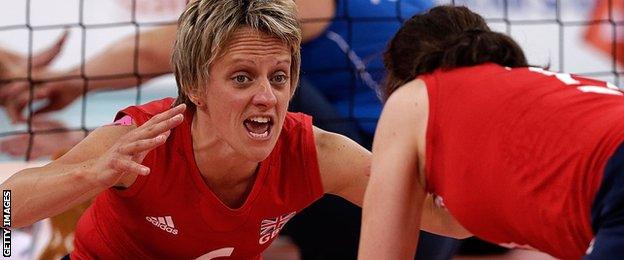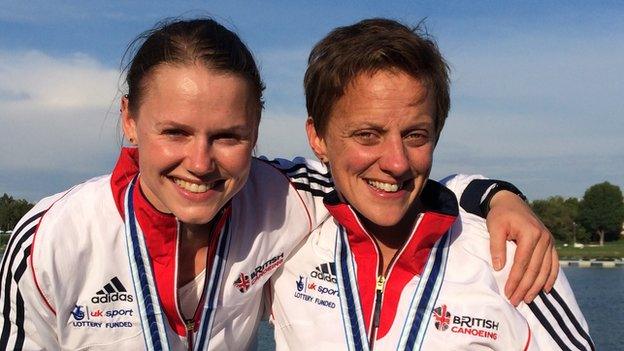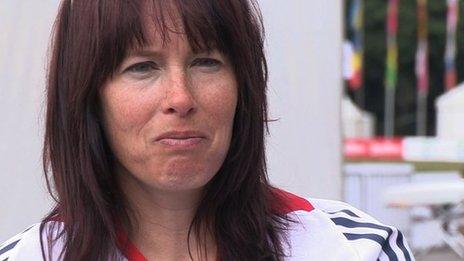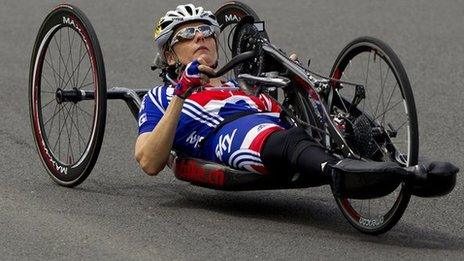Rio 2016: Emma Wiggs targets Para-canoe place after switching from volleyball
- Published
Emma Wiggs: Aiming for Rio 2016 Para-canoe success
Chasing and shearing sheep in Australia one day. Left paralysed the next.
A mystery virus, contracted as a teenager during her gap year down under, left Emma Wiggs unable to move.
It also made the self-professed "annoying sporty geek" relentlessly determined.
A home Paralympic appearance as a sitting volleyball player and three Para-canoe world titles is proof of that.
"I'm just making the best of the bits of me that still work," the 35-year-old told BBC East Midlands Today.
"And hopefully I can carry on doing that every day."
Developing a stubborn streak
The virus that struck Wiggs down has never been identified, and it left her with damaged nerves in her legs.
"I was chasing and shearing sheep and working on a farm. About six weeks in I contracted a virus, we still don't know where from, but it basically left me paralysed in my arms and legs overnight," said Harrow-born Wiggs.
"I'm lucky that my arms recovered, but my legs didn't. That is obviously a life-changing experience.
"But I didn't want it to influence my future and what I wanted to achieve, my hopes and aspirations."
"It made me more determined and more stubborn. Possibly, that is why I've ended up where I am today."

Emma Wiggs left sitting volleyball, a sport that lost its UK Sport funding after 2012, to become a full-time athlete with British Canoeing
Now, the teenager who went on to study sports science and realised her ambition of becoming a PE teacher, is focused on reaching her second Paralympic Games - but this time in an entirely different sport.
Whirlwind success
After being part of Team GB's sitting volleyball squad at London 2012, Wiggs decided to take up a new challenge on water.
Within five months of taking up Para-canoeing, Wiggs became sprint world champion in 2013.
She added to her K1 200m TA gold in Duisburg, Germany, with titles in Moscow a year later and Milan in 2015.
"It has been like a whirlwind," said the Diseworth-based Wiggs.
"Since the talent ID day for Paralympic sports in 2010 I've not looked back. I feel more like me, being back in the sporting environment, albeit in a different way."
Changing shape
Trying to reach Rio in September as part of the six-person para-canoe team is Wiggs' latest sporting focus.
Her passion for sport has taken her around the world and she is now a full-time athlete, based at the National Water Sports Centre in Holme Pierrepont, Nottingham.
"For me, sport has always been a huge part of my life. Through my early rehab, even if it was holding a hockey stick again while sitting down, I used that as a focus.
"Now I feel more strongly that sport is such a powerful tool. I'm incredibly lucky and privileged to be able to do it every day as my job," she said.
Seated in a kayak, trying to blast over 200m of water quicker than anyone in the world involves putting the body through a certain amount of physical strain.
"What I didn't realise about training at this level and full-time is the effect it has on changing your body shape. You turn yourself into a triangle," she continued, talking about building muscles in her shoulders and upper back.
Wiggs double delight at worlds win
"Effectively, it changes what you look like, quite dramatically. That is a commitment you have to make, to put the muscle on, which is not always what you want to do as a woman. But it makes the boat go faster."
'Cut-throat competition'
Wiggs is preparing for June's Paralympic trials in Nottingham, and will have two races to prove she is the one to carry Great Britain's kayaking hopes with her to Brazil.
"We train every day together, push each other on, help each other in the gym and on the water," she said.
"Then it comes down to one day where you are racing your team-mate, the people that you spend more time with than your partner. You are racing them for that spot.
"It is how elite sport should be, it is cut-throat. It's a challenge and you have to hope that on the day it goes your way and as a team you recognise that you pushed each other to get there."
Having relished the attention of a home Paralympics in 2012, Wiggs says she is ready for whatever is to come.
"It was a very different experience, but I feel very lucky to have had that experience and I feel slightly more prepared," she said. "You know what might be coming and what it feels like."
Interview conducted by BBC East Midlands Today's Mark Shardlow.
- Published19 August 2015

- Published30 August 2013

- Published5 September 2016
